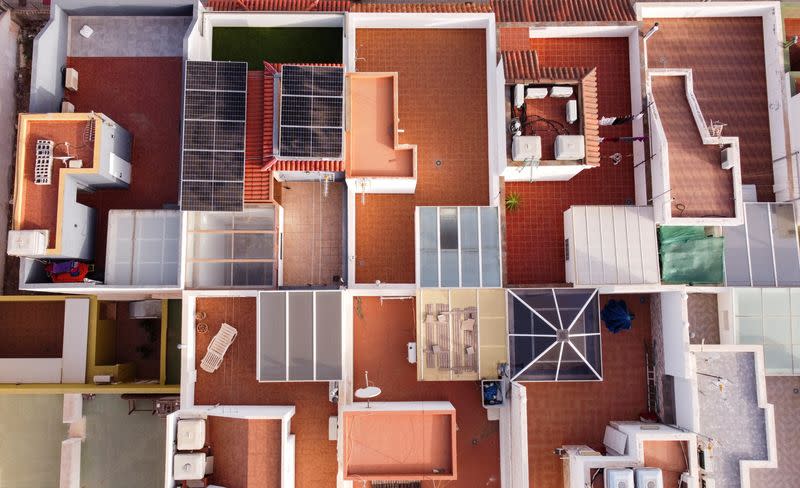Rooftop solar outlook dims in Spain amid lower energy prices

By Pietro Lombardi and Matteo Allievi
MADRID (Reuters) - Spanish households and firms installed fewer rooftop solar power systems in the first quarter of the year, extending a trend sparked by lower energy prices, inflation and the fading impact of subsidies and casting a cloud on the outlook for the year.
The decline was mostly in smaller domestic systems last year, but it is now spreading to larger-scale installations, solar industry group UNEF said on Tuesday.
The capacity installed between January and March fell roughly 26% from the same period last year, UNEF CEO Jose Donoso told an event in Madrid.
Companies in particular are holding back on solar installations to power commercial and industrial facilities, with new capacity down 22% and 30% respectively, compared with a 15% fall in domestic installations.
"The residential sector is bottoming out, but the fall is spreading to the industrial sector," Donoso said.
While consumers in the commercial and industrial sectors still see solar as a good investment, the decline in energy prices has removed the sense of urgency, Jon Macias, president of renewable lobby APPA's rooftop solar branch, told Reuters.
"In the industrial sector, the word 'urgency' was replaced by the word 'important'," he said. "That is, I have to do it but not right now. I can do it in the medium term," he said.
APPA now expects the sector to add some 1.4-1.6 gigawatts (GW) of capacity, down from 1.9 GW in 2023 and the record 2.6 GW achieved in 2022.
Earlier this year, it forecast 2024 to be in line with last year.
Donoso urged the government to offer new tax breaks and fiscal incentives to companies and households installing solar systems and to improve the regulatory framework for shared projects, in which solar panels provide energy to groups of consumers rather than a single household.
The slowdown comes after the market boomed between 2018 and 2022, boosted by generous subsidies and sky-rocketing energy prices after Russia invaded Ukraine.
Some companies, which quickly expanded their operations to ride the wave, are now posting million of euros in losses and announcing big layoffs.
"To meet the high demand for installation, these firms increased their workforce, but when prices fell in 2023 and demand slowed, they had to face very high fixed costs," said Victor Peiro, head of equity research at GVC Gaesco.
(Reporting by Pietro Lombardi and Matteo Allievi; Editing by Inti Landauro, Peter Graff and Nick Macfie)